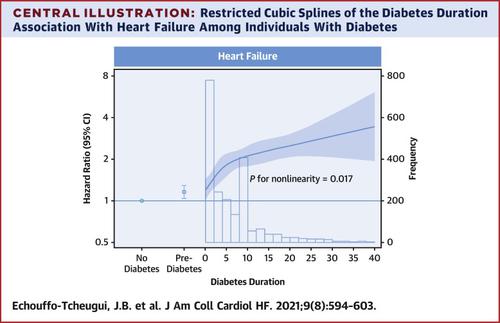JACC: Heart Failure ( IF 10.3 ) Pub Date : 2021-07-26 , DOI: 10.1016/j.jchf.2021.06.005 Justin B Echouffo-Tcheugui 1 , Sui Zhang 2 , Roberta Florido 3 , Carine Hamo 3 , James S Pankow 4 , Erin D Michos 3 , Ronald B Goldberg 5 , Vijay Nambi 6 , Gary Gerstenblith 3 , Wendy S Post 3 , Roger S Blumenthal 3 , Christie M Ballantyne 6 , Josef Coresh 2 , Elizabeth Selvin 2 , Chiadi E Ndumele 3

|
Objectives
This study assessed the association of diabetes duration with incident heart failure (HF).
Background
Diabetes increases HF risk. However, the independent effect of diabetes duration on incident HF is unknown.
Methods
We included 9,734 participants (mean age 63 years, 58% women, 22% Black) at ARIC (Atherosclerosis Risk In Communities) Visit 4 (1996-1998) without HF or coronary heart disease. We calculated diabetes duration at Visit 4 (baseline), utilizing diabetes status at the first 4 ARIC visits spaced 3 years apart, and self-reported diagnosis date for those with diabetes diagnosed before Visit 1. We used Cox regression to estimate associations of diabetes duration with incident HF, accounting for intercurrent coronary heart disease and other risk factors. We performed analyses stratified by age (<65 years or ≥65 years), race, sex, and glycemic control (hemoglobin A1C [HbA1C] consistently <7%, vs HbA1C ≥7%), with tests for interaction.
Results
Over 22.5 years of follow-up, there were 1,968 HF events. Compared to those without diabetes, HF risk rose with longer diabetes duration, with the highest risk among those with ≥15 y diabetes duration (HR: 2.82; 95% CI: 2.25-3.63). Each 5-year increase in diabetes duration was associated with a 17% (95% CI: 11-22) relative increase in HF risk. Similar results were observed across HF subtypes. The HF and diabetes duration associations were stronger among those aged <65 years, those with HbA1C ≥7%, those with a body mass index ≥30 kg/m2, women, and Blacks (all P interactions <0.05).
Conclusions
Delaying diabetes onset may augment HF prevention efforts, and therapies to improve HF outcomes might target those with long diabetes duration.
中文翻译:

糖尿病持续时间和心力衰竭事件
目标
这项研究评估了糖尿病病程与心力衰竭(HF)事件的关联。
背景
糖尿病会增加心力衰竭的风险。然而,糖尿病病程对心力衰竭事件的独立影响尚不清楚。
方法
我们纳入了 ARIC(社区动脉粥样硬化风险)第 4 次访视(1996-1998 年)中的 9,734 名参与者(平均年龄 63 岁,58% 为女性,22% 为黑人),无心力衰竭或冠心病。我们利用相隔 3 年的前 4 次 ARIC 就诊时的糖尿病状态以及在就诊 1 之前诊断出的糖尿病患者的自我报告诊断日期,计算了第 4 次就诊时的糖尿病病程(基线)。我们使用 Cox 回归来估计糖尿病病程之间的关联发生心力衰竭、并发冠心病和其他危险因素。我们按照年龄(<65 岁或≥65 岁)、种族、性别和血糖控制(血红蛋白 A 1C [HbA 1C ] 一致<7%,vs HbA 1C ≥7%)进行分层分析,并进行相互作用测试。
结果
经过 22.5 年的随访,共发生 1,968 起心力衰竭事件。与非糖尿病患者相比,心力衰竭风险随着糖尿病病程的延长而增加,其中糖尿病病程≥15年的患者发生心力衰竭的风险最高(HR:2.82;95% CI:2.25-3.63)。糖尿病病程每增加 5 年,心力衰竭风险相对增加 17%(95% CI:11-22)。在 HF 亚型中观察到类似的结果。在年龄<65岁、HbA 1C ≥7%、体重指数≥30 kg/m 2 、女性和黑人中,心力衰竭和糖尿病持续时间的相关性更强(所有P相互作用<0.05)。
结论
延迟糖尿病发病可能会加强心力衰竭的预防工作,而改善心力衰竭结果的治疗可能会针对糖尿病病程较长的患者。











































 京公网安备 11010802027423号
京公网安备 11010802027423号